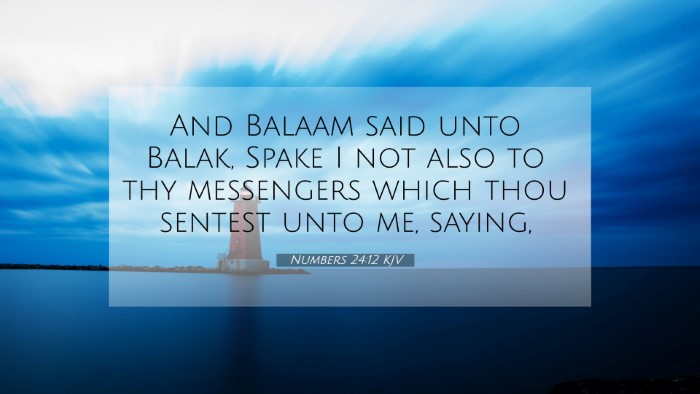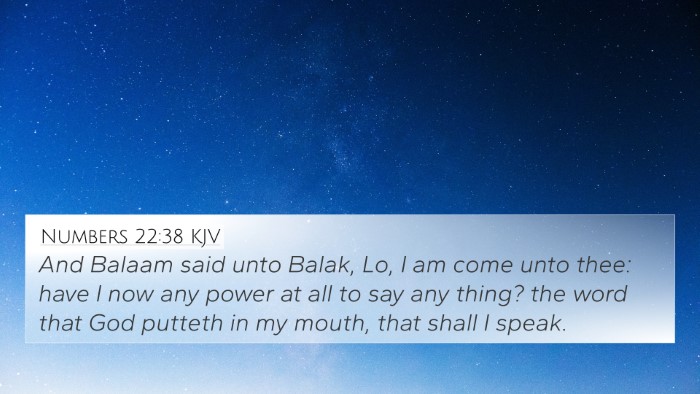Understanding Numbers 24:12
Verse Context: Numbers 24:12 states, "And Balaam said unto Balak, Did I not tell thee, saying, All that the Lord speaketh, that I must do?" This verse captures a moment in the narrative of Balaam, a prophet called upon by Balak, the king of Moab, to curse Israel.
Summary of Commentary Insights
This verse demonstrates Balaam's recognition of the authority of God’s word and the limitations on his actions as a prophet. The commentaries collectively highlight several key aspects:
- Divine Authority: Matthew Henry emphasizes that Balaam acknowledges the necessity of adhering to God’s commands over human desires. He realizes that he can only speak what God allows.
- Obedience to God: Adam Clarke points out that Balaam is reminding Balak of the message he delivers as a servant of the Lord, illustrating complete submission to God’s will.
- Moral Agency: Albert Barnes discusses Balaam's conflicted nature, illuminating the struggle between his desire for riches and his responsibility to deliver true prophecies.
Cross-References for Deeper Understanding
To fully comprehend the implications of Numbers 24:12, it's beneficial to explore cross-references within the Bible:
- Exodus 7:1: God makes Moses as a god to Pharaoh, indicating prophetic authority.
- Deuteronomy 18:18: God promises to raise up a prophet like Moses, emphasizing the importance of hearing Him.
- 1 Samuel 15:22: "To obey is better than sacrifice," underscoring the need for obedience to divine commands.
- Acts 3:22: Refers back to Moses as a prophet, reinforcing the continuum of prophetic messages.
- James 3:1: Highlights the greater judgment for those who teach, reminding us of the weight of prophetic words.
- Romans 11:29: God's gifts and calling are irrevocable, affirming His commitment to His covenants.
- 2 Peter 1:21: "For prophecy never came by the will of man, but holy men of God spoke as they were moved by the Holy Spirit," pointing to the divine origin of true prophecy.
Thematic Connections
Exploring thematic connections reveals broader meanings within the text. Here’s how Numbers 24:12 ties into larger Biblical narratives:
- Obedience to God's Will: This theme resonates throughout Biblical texts, stressing that believers are called to prioritize divine direction over personal motives.
- Prophetic Integrity: Balaam serves as a cautionary example of a prophet who knows what to say but struggles against temptation, mirroring the struggles of many Biblical figures.
- The Sovereignty of God: Balaam's predicament illustrates the concept that God’s purpose prevails despite human intentions.
Tools for Bible Cross-Referencing
For those interested in delving deeper into Bible cross-referencing, here are some recommended tools:
- Bible concordances help locate verses and themes across texts.
- Online Bible cross-reference guides offer searchable databases for ease of use.
- Printable charts of cross-references are helpful for study groups and personal reflection.
Using Cross-References in Bible Study
Utilizing a cross-reference system effectively enriches study sessions. Here are some methods:
- Identify similar themes across books to see their development.
- Track character arcs to recognize how they conform or diverge throughout Scripture.
- Link verses that provide complementary teachings, such as Old Testament laws and New Testament interpretations.
Conclusion
In conclusion, Numbers 24:12 serves as a pivotal verse illustrating the dynamics of prophetic utterance and divine authority. It invites readers into an inter-Biblical dialogue that spans multiple themes of obedience, integrity, and sovereignty, providing rich soil for study through comparative Bible verse analysis and thematic Bible verse connections.




